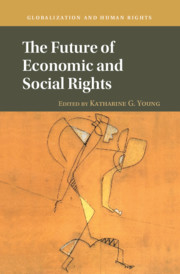Book contents
- The Future of Economic and Social Rights
- Globalization and Human Rights
- The Future of Economic and Social Rights
- Copyright page
- Contents
- Figures
- Tables
- Contributors
- Abbreviations
- Foreword
- Acknowledgements
- 1 Introduction
- Part I Adjudication and Rights
- Part II Adjudication and Rights in Context
- Part III Adjudication and Rights
- Part IV Economic and Social Rights in Retrenchment
- Part V Economic and Social Rights in Development
- Part VI Rights and Accountability
- Books in the Series
Part III - Adjudication and Rights
Democracy and Courts
Published online by Cambridge University Press: 04 April 2019
- The Future of Economic and Social Rights
- Globalization and Human Rights
- The Future of Economic and Social Rights
- Copyright page
- Contents
- Figures
- Tables
- Contributors
- Abbreviations
- Foreword
- Acknowledgements
- 1 Introduction
- Part I Adjudication and Rights
- Part II Adjudication and Rights in Context
- Part III Adjudication and Rights
- Part IV Economic and Social Rights in Retrenchment
- Part V Economic and Social Rights in Development
- Part VI Rights and Accountability
- Books in the Series
Summary
- Type
- Chapter
- Information
- The Future of Economic and Social Rights , pp. 185 - 286Publisher: Cambridge University PressPrint publication year: 2019
- 11
- Cited by

